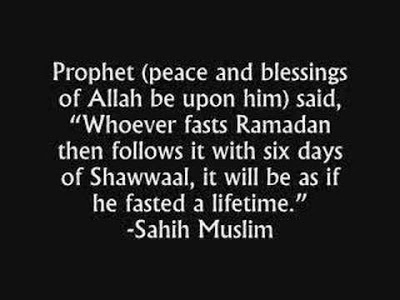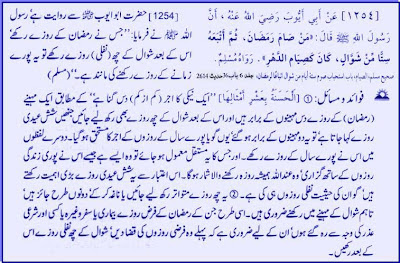
Shawwal is the tenth month in the lunar calendar, as mentioned earlier. The first of Shawwal is Eidul Fitr. After the festivity of Eid it is recommended to observe six days of fast. This fast may be observed continuously non-break, or it may be observed one day at a time. If you observe it continuously, you may start on the fourth day and end on the ninth of day Shawwal, or you may select days at random, provided you complete six days before the end of Shawwal. For instance, you may observe the third, fifth, seventh, ninth, 14th and 15th days.
Abu Ayyub Al-Ansari (raa) related the Messenger of Allah, (saas), said:
“Whoever observes the Ramadan fast and follows it with six days of fast in Shawwal, it is as if he has fasted Dahr (the whole year).” (Bukhari) It has been mentioned earlier that Dahr means the whole year. Possibly it may also mean forever, or for life.
Analyzing this hadith, our jurists (`Ulama) explained how according to this hadith, a Muslim who fasts during Ramadan every year and follows it with six days fast of Shawwal, will be credited for fasting a whole lifetime. The Jurists correctly said: a good deed (hasanah) is rewarded a minimum of ten times its equivalent. It follows, then, that one Ramadan is equivalent to ten months of fasting, and the clincher, six days, is equal to two months, (6×10=60). That undoubtedly completes the year’s twelve months. Thus, we see the wisdom and the reason why the Prophet (saas) mentioned six days after Ramadan in Shawwal, not five or seven.










Gr8 j0b. May Allah bless nd pr0tect awll of us. Nd let us d0 every gud deed ameen.ry gud deed ameen.